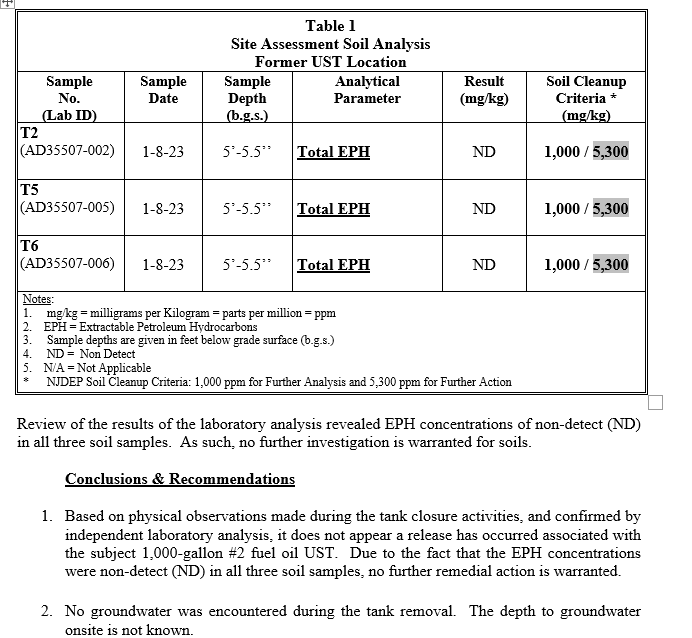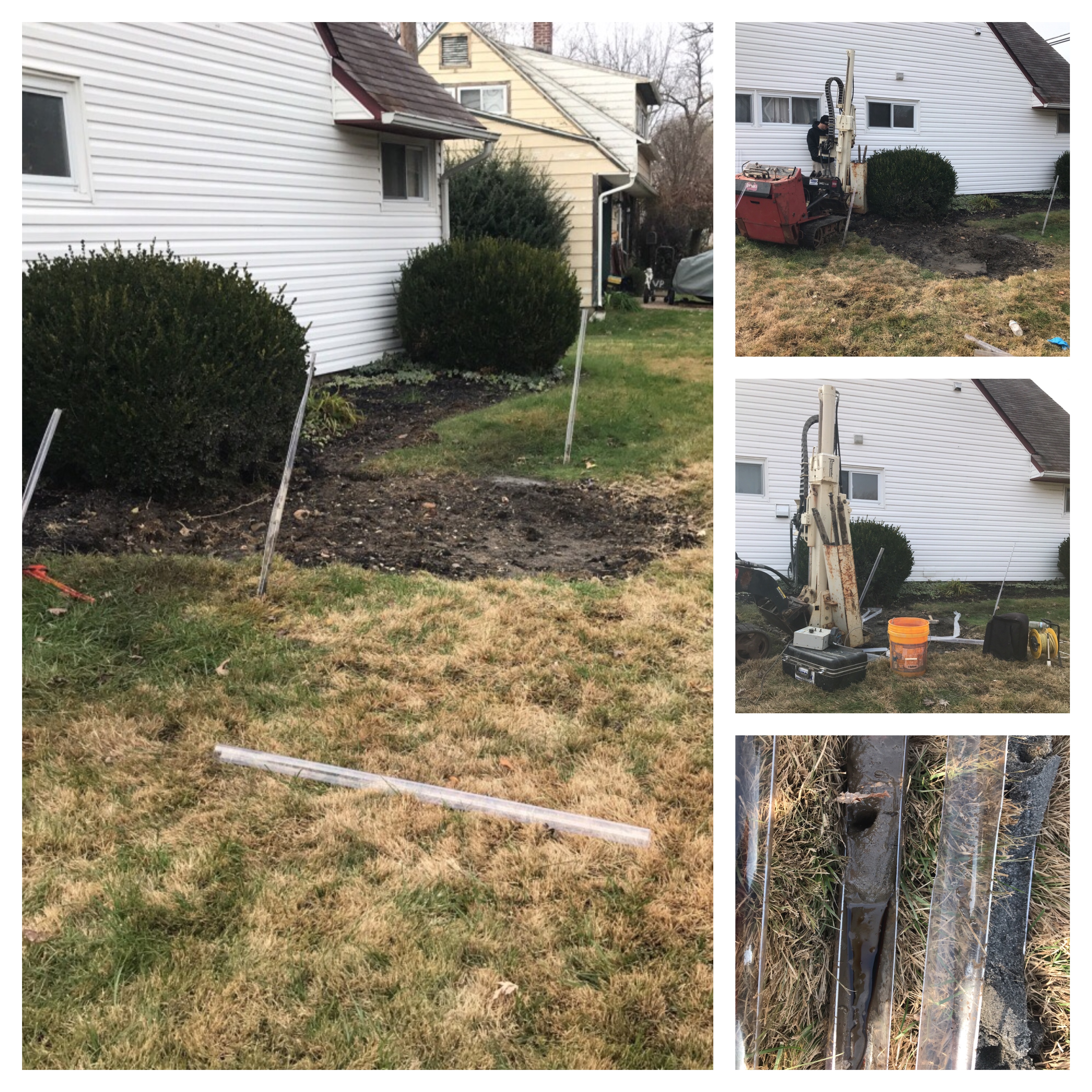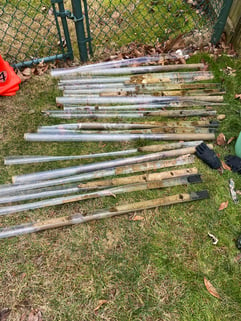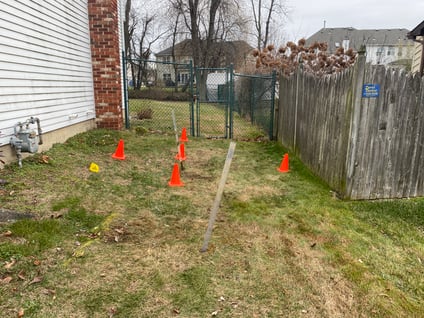The story goes, you have a property where an underground oil tank was removed by the previous owner. You as the current owner, didn’t question any environmental issues with the tank removal when you bought the property, now you are selling the property and the buyer is asking for testing in the area where the tank was removed.
The concern with any tank is if the tank leaked and the leak is severe enough that remediation is required by environmental regulations. There are many tanks that were removed and testing was not completed so the tank is undocumented for leaks. There are also many tanks that leaked and the leak is not disclosed to buyers.
Below is a page from a Tank Closure Report (1 page of about 45 pages), if you read the Conclusions & Recommendations, it clearly says the tank did not leak and why. If you are not in possession of a similar document, you don't have what you need.

The previous owner supplied you, the current homeowner, with the following:
- Tank removal contract stating it was paid in full.
- A copy of the permit for removal from the town
- Approval sticker from the construction office.
Why are the items above not enough for information regarding an underground oil tank removal to sell the house? In today's real estate market home buyers are more informed and they want iron clad data proving that the oil tank did not leak.
Those three pieces of information (contract, permit and approval sticker) does not prove the tank did or did not leak. The data set you have are just pieces of information, not a cohesive report with a narrative that ends with the conclusion that the tank did not leak. Environmental reports show the proper paperwork as appendices, but the actual report details the work completed including the evaluation and testing performed to confirm the tank did not leak. If you are an uninformed buyer, which 15-20 years ago is true, you assumed the tank didn’t leak. But again, in todays market buyers are assuming it did leak as you, the homeowner, have nothing saying to prove otherwise.
 Example photos of soil sampling in a previously removed underground oil tank area.
Example photos of soil sampling in a previously removed underground oil tank area.
Allow me to elaborate in greater detail - while the tank had a permit for removal and inspection, the construction official is not inspecting for leaks, they inspect if the tank was removed, as per the permit. I have had inspectors BOTH pass and fail removed tanks that did leak. A soil test for soil contamination is around $130.00, (Before 2005 the cost would have been $75.00), not performing soil testing is basically saying the owner does not want to find a problem, it’s not due to cost. In short if you do not test you have a 100% probability of not finding anything. Hockey legend Wayne Gretzky once said, “You miss 100% of the shots you don't take.” If you do not test you can miss,
When assessing a tank for a leak you have to consider qualitative vs quantitative data?
Quantitative data is anything that can be counted or measured; it refers to numerical data. = testing
Qualitative data is descriptive, referring to things that can be observed but not measured = what you see.
If a few hundred dollars of laboratory testing was not completed when the tank was removed you have no Quantifiable data that the tank did not leak. The easiest explanation is when you go to a dentist for a checkup, they physically evaluate you (qualitative), but they will also take an Xray (quantitative). You know for any commercial tank in Delaware, New Jersey or Pennsylvania for the state to sign off they want laboratory testing, independent 3rd party certified testing to be 100% sure that no contamination exist from the tank.
There are laws regarding reporting an environmental leak from an oil tank when that leak is found. Prior to August of 2018, this law stated that a knowledgeable party was to report the leak, so a tank removal company telling a homeowner that the tank leaked and providing the NJDEP them the phone number to call, was very common. The question is if the homeowner actually reported the leak? Since August of 2018, the regulation requires the property owner to report the leak, but again, can you trust someone to report on themselves?
Free Consultation
888-301-1050
We had a call recently from a home buyer on the same street and town where Curren Environmental has removed multiple underground oil tank, meaning houses in the area have oil tanks. The house the buyers were under agreement had an underground oil tank removed in 1995, the current homeowners had the removal permit and contract, but no soil testing data and no environmental report of removal, proving the tank did not leak.
We provided soil testing services for new buyer and found soil contamination.


Thankfully for the buyers the property did not need remediation, but there was NJDEP reporting and further testing to close the environmental issue (about $4,500.00 in costs, also adding about two months to the settlement date). The tank did indeed leak, but no one reported it. If the buyer didn’t hire Curren they would have been sitting on a property with soil contamination they had neither created nor knew about but would have owned none the less, and no doubt a future buyer would have found.
I am buying/selling a property where a heating oil UST was removed. I have the permit from the municipality approving the work and closing the permit. Does this municipal approval certify that the tank did not leak? I am told I need to do soil sampling from the removed tank area to ensure that no contamination is present.
It is common for tanks to be removed without soil testing which can allow the owner to not find a problem. It is loophole in regulations that do not require soil testing after a tank is removed or closed in place. Your attorney should contact the seller’s side. You can always test the area after purchase, but you would want an addendum that the seller will pay remedial costs if contamination is found. Regulations place burden on the owner to cleanup so buying a property with contamination would befall the new owner, unless there are contractual obligations requiring seller to address contamination post sale. It is clearly cleaner to have buyer due diligence (soil testing) prior to purchase.

